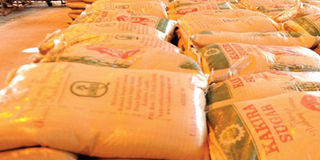Prime
Sugar mills zoning negates demand and supply forces

Sacks of Sugar in one of the stores in Kampala. FILE PHOTO
What you need to know:
The issue: Sugar Bill
Our view:
There cannot be one set of rules for the development, regulation and promotion of the sugar industry, and another for other agricultural sub-sectors.
The sugar regulatory policy or Sugar Bill, 2016, has run into trouble, with the President objecting to the policy and throwing it back to Parliament. The point of divergence is that the President prefers allocating a specific area of sugarcane production to ‘the big historical actors’ or manufacturers to operate a sugar mill, jaggery mill or a plant to process by-products of sugarcane.
But those opposed to the president’s stance say the ring-fencing only works to favour big sugarcane players at the expense of smaller or newcomer players.
Overall, the main objective of the Bill is good. It sets out “… to ensure that there is sustainable, diversified, harmonised, modern and competitive sugar sector to meet domestic, regional and international sugar requirements.”
But privileging by the Executive of the big sugar growers, or processors, or investors, who grow own sugarcane, risks generating negative unintended consequences.
And here is why.
First, Uganda runs a free market economy, with prices of goods and services determined by unrestricted market and choice of suppliers or consumers. Here the forces of supply and demand have been free from any intervention by a government, or by any other authority.
But this new diktat in the Sugar Bill, 2016, now seeks to reverse this old practice. And as expected, problematic questions are already being asked. Why must the big historical sugarcane actors get this preferential treatment? Why is such discriminatory agricultural production policy not applied uniformly across the board to also protect big dairy farmers and their milk plants, as well as coffee farmers and their coffee hullers?
Why must free market forces be selectively delegislated and enforced to operate in the sugarcane industry and not other agricultural sub-sectors? Why isn’t similar agriculture policies applied to kill off ‘small parasite new comers’ milk or coffee producers or suppliers and their plants within proximity of the big players?
Of course, the solid argument here is that the big historical sugarcane actors have invested in corporate social responsibility and have given back to neighbouring communities. They have provided scholarships, built schools and health centres, and developed feeder road network. They also have out-growers bound by contract, who are now drifting to supply the new comers. Given all these, indeed, the old-timers risk laying off workers, scaling down sugar and biomass power production, etc.
But there cannot be one set of rules for the development, regulation and promotion of the sugar industry, and another for other agricultural sub-sectors. In sum, every sugarcane farmer sugar or manufacturer should be allowed free choice to grow and sell to or buy from the highest or lowest bidder as is the case with all other agricultural sub-sectors.




